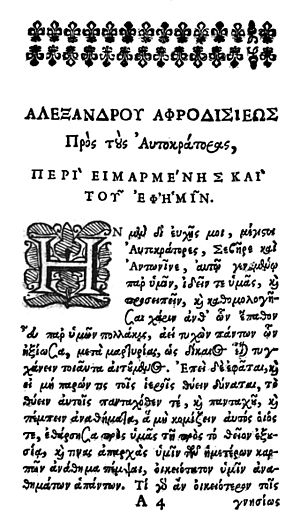Alexander of Aphrodisias facts for kids
Quick facts for kids
Alexander of Aphrodisias
|
|
|---|---|
| Born | Mid-2nd century A.D. |
| Died | Mid-3rd century A.D. |
| School | Peripatetics Alexandrists (posthumously) |
|
Influences
|
|
|
Influenced
|
|
Alexander of Aphrodisias (Greek: Ἀλέξανδρος ὁ Ἀφροδισιεύς) was a famous Ancient Greek philosopher. He lived around 200 AD. He was known as the best commentator on the writings of Aristotle.
Alexander came from a place called Aphrodisias in Caria (modern-day Turkey). He lived and taught in Athens, Greece. He was the head of the Peripatetic school, a group of philosophers who followed Aristotle's ideas.
He wrote many books explaining Aristotle's works. Some of his own original writings also still exist. These include a book called On Fate, where he argued against the idea that everything is decided beforehand. He also wrote On the Soul. People thought his explanations of Aristotle were so good that they called him "the commentator."
Contents
Who Was Alexander of Aphrodisias?
Alexander was born in Aphrodisias, a city in what is now Turkey. He moved to Athens around the end of the 100s AD. He studied with philosophers named Sosigenes the Peripatetic and Herminus. He might also have studied with Aristotle of Mytilene.
In Athens, Alexander became the leader of the Peripatetic school. He taught philosophy there. He wrote his book On Fate for the Roman Emperors Septimius Severus and Caracalla. This shows he was teaching between 198 and 209 AD. A stone carving found in Aphrodisias confirms he led a school in Athens. It also shows his full name was Titus Aurelius Alexander.
Alexander's Famous Commentaries
Alexander wrote many commentaries (explanations) on Aristotle's books. He wanted to show Aristotle's true ideas, without mixing them with other philosophies.
His existing commentaries explain parts of Aristotle's:
- Prior Analytics (about logic)
- Topics (about arguments)
- Meteorology (about weather and natural events)
- Sense and Sensibilia (about senses)
- Metaphysics (about the nature of reality)
Some commentaries thought to be his are now believed to be by others. For example, the one on the Sophistical Refutations. Many of his commentaries are now lost. These include works on Physics and On the Soul.
In 2007, a very old text called the Archimedes Palimpsest was studied. It might contain an early commentary on Aristotle's Categories. Experts think Alexander is the most likely author.
Original Books by Alexander
Alexander also wrote his own books. Some of these still exist today:
- On the Soul
- Problems and Solutions
- Ethical Problems
- On Fate
- On Mixture and Growth
Some books that were once thought to be his are now believed to be written by others. These include Medical Questions and Physical Problems.
Other books by Alexander are found in Arabic translations. These include:
- On the Principles of the Universe
- On Providence
- Against Galen on Motion
On the Soul
His book On the Soul (De anima) talks about the soul. He followed Aristotle's ideas. Alexander believed that human reason is connected to the body. He argued that the soul is not immortal, meaning it does not live forever. He thought that the "active intellect" (the part of the mind that helps us understand) was actually God.
A second part of this work is called the Supplement to On the Soul (Mantissa). It has many short pieces. Some are about the mind, others about physics and ethics.
On Fate
On Fate is a very important book. In it, Alexander argued against the Stoic idea that everything is already decided. The Stoics believed in determinism, meaning all events are set by a chain of causes.
Alexander disagreed. He said that humans have free will. This means we can make our own choices and are responsible for them. This idea is similar to what we call libertarianism today.
On Mixture and Growth
This book discusses how different physical things can mix together. It explains Aristotle's ideas on this topic. It also argues against the Stoic view of how things mix.
On the Principles of the Universe
This book is only found in Arabic. It explains Aristotle's ideas about the universe and how it works. Alexander wanted to make Aristotle's system clearer and more complete. He discussed how the heavens move and how they affect the world below.
On Providence
This book also survives in Arabic. In it, Alexander disagreed with the Stoic idea that divine Providence (God's care) controls every small detail in the world. He thought this idea was not fitting for the gods. Instead, he believed that providence affects the world by causing things to be born and die, but it doesn't directly control each person's life.
Alexander's Lasting Influence
By the 500s AD, Alexander's explanations of Aristotle were so helpful that people called him "the commentator." His works were highly valued by Arab scholars, who translated many of them. He was often quoted by the famous Jewish philosopher Maimonides.
In the early Renaissance (a period of rebirth in Europe), Alexander's idea that the soul is not immortal became important. Philosophers like Pietro Pomponazzi and Cesare Cremonini adopted his views. The group of philosophers who followed Alexander's ideas were known as Alexandrists.
You might have heard of Alexander's band. This is an optical phenomenon (a light effect) seen in rainbows. It is named after Alexander of Aphrodisias.
See also
 In Spanish: Alejandro de Afrodisias para niños
In Spanish: Alejandro de Afrodisias para niños
- Alexander's band - an optical phenomenon associated with rainbows
- Free will in antiquity
Images for kids
 | May Edward Chinn |
 | Rebecca Cole |
 | Alexa Canady |
 | Dorothy Lavinia Brown |





